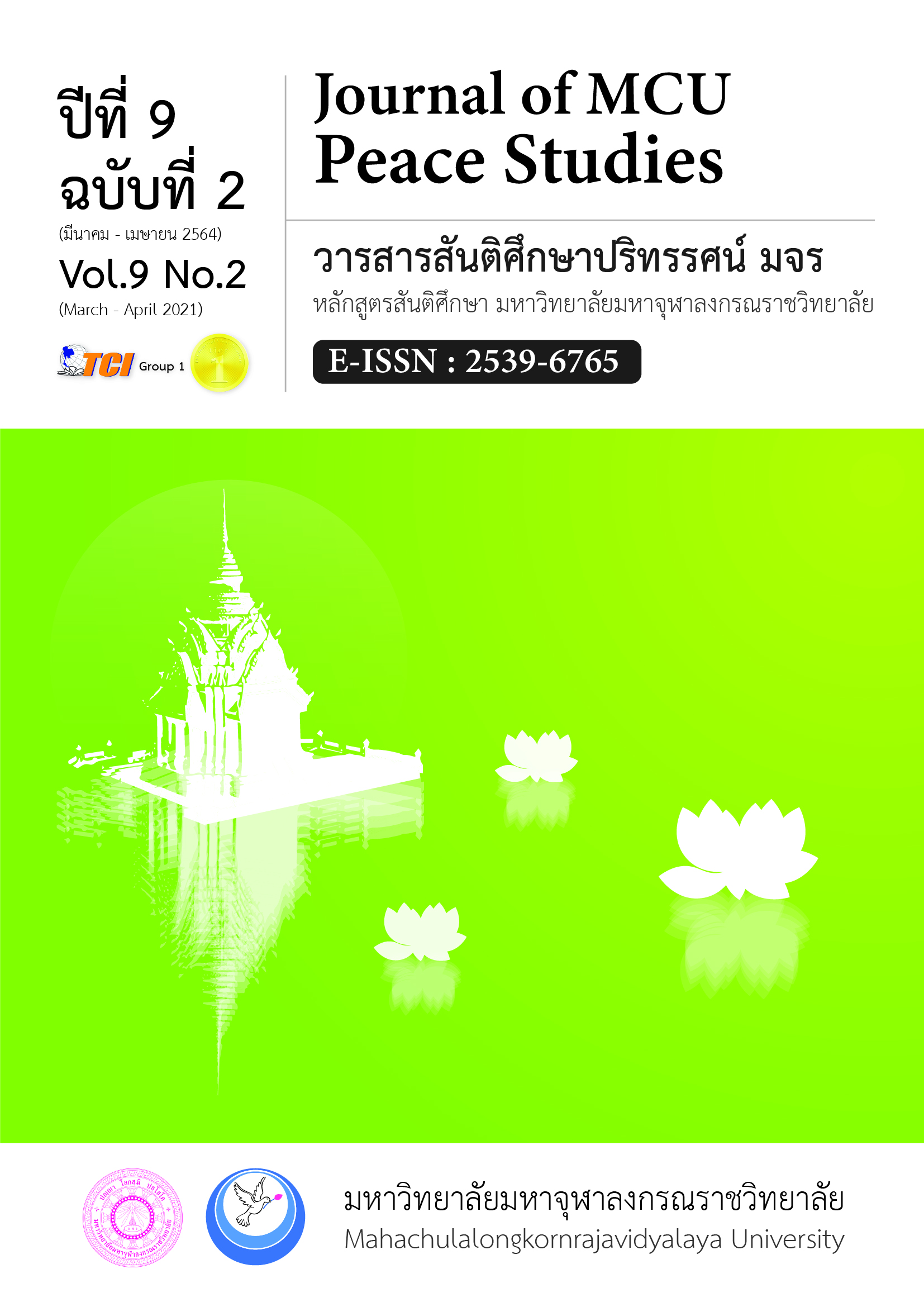รูปแบบการพัฒนาภาวะผู้นำทางวิชาการของ ผู้บริหารสถานศึกษาขั้นพื้นฐานยุคดิจิทัล
Main Article Content
บทคัดย่อ
บทความวิจัยครั้งนี้มีวัตถุประสงค์เพื่อ 1) เพื่อศึกษาข้อมูลพื้นฐานสำหรับการสร้างรูปแบบการพัฒนาผู้นำทางวิชาการของผู้บริหารสถานศึกษาขั้นพื้นฐานยุคดิจิทัล 2) สร้างรูปแบบการพัฒนาภาวะผู้นำทางวิชาการของผู้บริหารสถานศึกษาขั้นพื้นฐานยุคดิจิทัล 3) เพื่อประเมินรูปแบบการพัฒนาภาวะผู้นำทางวิชาการของผู้บริหารสถานศึกษาขั้นพื้นฐานยุคดิจิทัล เป็นการวิจัยแบบผสมผสานกลุ่มตัวอย่างคือผู้บริหารสถานศึกษาจำนวน 380 คน การวิจัยแบ่งเป็น 3 ระยะคือ ระยะที่ 1 ศึกษาข้อมูลพื้นฐานสำหรับการสร้างรูปแบบ การพัฒนาภาวะผู้นําทางวิชาการ ของผู้บริหารสถานศึกษาขั้นพื้นฐาน ระยะที่ 2 การสร้างรูปแบบการพัฒนาภาวะผู้นำทางวิชาการของผู้บริหารสถานศึกษาขั้นพื้นฐานยุคดิจิทัล ระยะที่ 3 การประเมินผลรูปแบบการพัฒนาภาวะผู้นําทางวิชาการของผู้บริหารสถานศึกษาขั้นพื้นฐานยุค เครื่องมือที่ใช้ ได้แก่ 1) แบบสอบถามเป็นแบบมาตราส่วนประมาณค่า 5 ระดับ 2) แบบสัมภาษณ์กึ่งมีโครงสร้าง สถิติที่ใช้ในการวิเคราะห์ข้อมูลเชิงปริมาณ ได้แก่ ค่าเฉลี่ยและค่าเบี่ยงเบนมาตรฐาน ข้อมูลเชิงคุณภาพ ได้แก่ การวิเคราะห์เนื้อหา ค่ามัธยฐาน ค่าฐานนิยม และค่าพิสัยระหว่างควอไทล์
ผลการวิจัยพบว่า 1) ข้อมูลพื้นฐานพฤติกรรมภาวะผู้นำทางวิชาการของผู้บริหารสถานศึกษา พบว่า พฤติกรรมภาวะผู้นำของผู้บริหารอยู่ในระดับปานกลาง ค่าเฉลี่ย ( =3.41, S.D.=0.67) 2) ผลการสร้างรูปแบบการพัฒนาภาวะผู้นำทางวิชาการ มี 2 องค์ประกอบหลัก คือ องค์ประกอบหลักที่ 1 ภาวะผู้นำทางวิชาการ มี 6 ด้าน ได้แก่ การมีวิสัยทัศน์ผู้นำแบบดิจิทัล การสร้างเครือข่ายดิจิทัลเพื่อการเรียนรู้ การพัฒนาศักยภาพบุคลากร การบริหารหลักสูตรและการจัดการเรียนรู้ด้วยเทคโนโลยี การสื่อสารด้วยเทคโนโลยีที่ทันสมัยและการนิเทศ กำกับ ติดตาม วัดและประเมินผลด้วยเทคโนโลยี องค์ประกอบหลักที่ 2 วิธีการพัฒนาภาวะผู้นำทางวิชาการ มี 3 ด้าน ได้แก่ Google For Education Line Facebook 3) ผลการประเมินความเหมาะสมความ เป็นไปได้และความเป็นประโยชน์ของรูปแบบการพัฒนาภาวะผู้นำทางวิชาการของผู้บริหารสถานศึกษาขั้นพื้นฐานยุคดิจิทัลพบว่าภาพรวมทั้งหมดอยู่ในระดับมาก ( = 4.08, S.D.=0.47)
Article Details
ทัศนะและความคิดเห็นที่ปรากฏในบทความในวารสาร ถือเป็นความรับผิดชอบของผู้เขียนบทความนั้น และไม่ถือเป็นทัศนะและความรับผิดชอบของกองบรรณาธิการ ยินยอมว่าบทความเป็นลิขสิทธิ์ของวารสาร
เอกสารอ้างอิง
Am Don Kloy, S. (2013). Role of school administrators in the century 21. Humanities and Social Sciences Journal of Graduate School, Pibulsongkram Rajabhat University, 7(1), 1-8.
Anan Navee, P. (2009). Principles and concepts Educational Administration Theory. (2nd ed.). Bangkok: Montree.
Chamchoy, S. (2018). School management in the digital age. Bangkok: Pimpluck Chulalongkorn University Press.
chareonwongsak, K. (2008). Analyze the factors contributing to the increase in educational achievement.Education alarticles. Retrieved June 8, 2020, from http://oknation.nationtv.tv/blog/kriengsak.
Imlaiwan, A. & Chongwilaikasem, W. (2018) Using Facebook as a communication channel. Teach in communication science. Journal of Communication Arts, Master of Business, 7(2), 1-19.
Issararak, A. (2005). Relationship between leadership and school effectiveness. Secondary Education, Eastern Region. (Master's Thesis). Educational Administration, Burapha University. Bangkok.
Pandam, S. (2020). Turning the crisis into an opportunity for Thai vocational education on the new normal. Journal of Social Sciences and Anthropology Buddhist. 5(7), 1-13.
Pholdongnok, J. (2013). Development of an online training system for you at the technology user service provider Commercial bank. Academic journal. 6(1), 1-14.
Pow Phan, C. (2014). Concepts and fundamental theories of school administrators' leadership in21st. Century Journal of Educational Administration Khon Kaen University, 12(1),1-14.
Roon Charoen, T. (2012). Professionalism in educational organization and administration in the educational reform era. (7th ed.). Bangkok: LT Place Co., Ltd.
Sukthudyot, W. (2015). A model for the development of academic management competencies of the administrators. Educational institutions under the Primary Educational Service Area Office. (Doctoral Dissertation). Naresuan University. Phitsanulok.
Sunthornthanaphon, N. (2019). A study of students' satisfaction towards teaching and learning management.Via Google Class Room Course in Western music history. Institute of Culture and Arts Srinakharinwirot University, 21(1), 1-14.
Suwanatat, P. (2020). Epidemic causes inequality to learn online. May not answer Joat Because some children lack equipment. Retrieved May 9, 2020., from https://brandinside.asia/%E0%B9%89how-covid-19-transform-education-system/.
TDRI. (2013). New Development Model: Toward Quality Growth by Increasing Productivity. Retrieved May 9, from https://thaipublica.org/2013/11/tdri-year-end-4/
Thawuthit, C. (2015). Model for Academic Leadership Development School level Secondary Education. (Doctoral Dissertation). Sakon Nakhon Rajabhat University. Sakon Nakhon.
Uchanapanya, N. (2020). Me, let's win Panya in 2020 when the virus in 2019 is changing. World education system. Retrieved May 9, 2020 from https://www.eef.or.th/30577/.
Wannasri, J. (2010). Academic leadership of school administrators. Journal of Education. Naresuan University, 12(1), 35-49.
Waston, S. H. (2000). The Leadership requirements in 21 century. The Perceptions of Canadian private secto leaders. n.p.
Wehachat, R. (2008). Development of quality management models for educational Institutions Basic. (Doctoral Dissertation). Burapha University. Chonburi.


